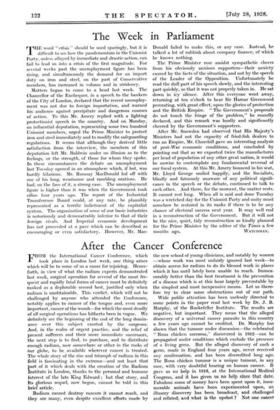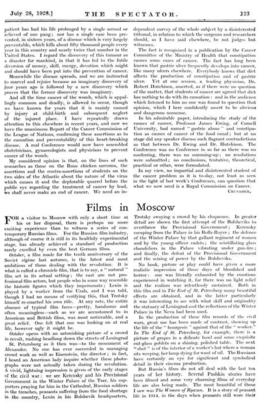After the Cancer Conference
FROM the International Cancer Conference, which took place in London last week, one thing arises which will be to some of us a cause for rejoicing. Hence- forth, in view of what the radium experts demonstrated last week, surgical operation for several of the most fre- quent and rapidly fatal forms of cancer must be definitely ranked as a deplorable second best, justified only when radium is unobtainable. This verdict, which will not be challenged by anyone who attended the Conference, notably applies to cancer of the tongue and, even more important, cancer of the womb—for which the most deadly of all surgical operations has hitherto been in vogue. We definitely see the beginning of the end of the long domin- ance over this subject exerted by the surgeons. And, in the realm of urgent practice, and the relief of present sufferers and their more immediate successors, the next step is to find, to purchase, and to distribute enough radium, now somewhere or other in the rocks of Our globe, to be available wherever cancer is treated. The whole story of the rise and triumph of radium in this field is fascinating in the extreme—and not least that part of it which deals with the creation of the Radium Institute in London, thanks to the personal and humane interest of the late Xing Edward : but that story, and Its glorious sequel, now begun, cannot be told in this brief article.
Radium cannot destroy cancers it cannot reach, and they are many, even despite excellent efforts made by the new school of young clinicians, and notably by women —whose work was most unfairly ignored last week—to obtain access for radium to do its blessed work in places which it has until lately been unable to reach. Immea- surably better than the best treatment is the prevention of a disease which is at this hour largely preventable by the simplest and most inexpensive means. Let us there- fore try to clear some obstructions out of our path.
Wide public attention has been uselessly directed to some points in the paper read last week by Dr. J. B. Murphy, of the Rockefeller Institute. The results are negative, but important. They mean that the alleged discovery of a universal cancer parasite in this country a few years ago cannot be credited. Dr. Murphy has shown that the tumour under discussion—the celebrated " Rous chicken sarcoma," discovered in 1912—can be propagated under conditions which exclude the presence of a living germ. But the alleged discovery of such a germ, made in England four years ago, never received any confirmation, and has been discredited long ago. The Rous chicken tumour is a unique tumour, in any case, with very doubtful bearing on human cancer. It gave us no help in 1918, at the International Medical
Congress, ' and it has given us no help since that date.
Fabulous sums of money have been spent upon it, innu- merable animals have been experimented upon, an illusory discovery has been broadcast, and challenged and refuted; and what is the upshot ? Not one cancer patient has had his life prolonged by a single second or relieved of one pang ; nor has a single case been prey vented, in sixteen years, of a disease which is very largely preventable, which kills about fifty thousand people every year in this country and nearly twice that number in the United States. I regard the discovery of this tumour as a disaster for mankind, in that it has led to the futile diversion of money, skill, energy, devotion which might and should have been put into the prevention of cancer.
Meanwhile the disease spreads, and we are instructed to marvel and rejoice because an imaginary discovery of four years ago is followed by a new discovery which proves that the former discovery was imaginary.
And all the time cancer of the womb, which is appal- lingly common and deadly, is allowed to occur, though we have known for years that it is mainly caused by injury at child-birth and subsequent neglect of the injured place. I have repeatedly drawn attention to this elsewhere in recent years, and now we have the unanimous Report of the Cancer Commission of the League of Nations, confirming these assertions as to the causation and preventability of this heart-breaking disease. A real Conference would now have assembled obstetricians, gynaecologists and physicians to prevent cancer of the womb.
My considered opinion is that, on the lines of such researches as those on the Rous chicken sarcoma, the assertions and the contra-assertions of students on the two sides of the Atlantic about the nature of the virus which causes it and the deplorable quarrel before the public eye regarding the treatment of cancer by lead, we shall never make an end of cancer. We need an in- dependent survey of the whole subject by a disinterested tribunal, in relation to which the surgeons and researchers should, as I have said elsewhere, be not judges but witnesses.
The fact is recognized in a publication by the Cancer Committee of the Ministry of Health that constipation causes some cases of cancer. The fact has long been known that gastric ulcer frequently develops into cancer, like many ulcers elsewhere. Everybody knows that diet affects the production of constipation and of gastric ulcer. Yet at one session, a leading physician, Dr. Robert Hutchison, asserted, as if there were no question of the matter, that students of cancer are agreed that diet has nothing to do with its causation : and in the audience which listened to him no one was found to question that opinion, which I here confidently assert to be obvious and dangerous nonsense.
In his admirable paper, introducing the study of the causes of cancer, Professor James Ewing, of Cornell University, had named " gastric abuse " and constipa- tion as causes of cancer of the food canal ; but at no stage did any speaker discuss such flagrant contradictions as that between Dr. Ewing and Dr. Hutchison. The Conference was no Conference in so far as there was no conferring, there was no summing-up ; no resolutions were submitted ; no conclusions, tentative, theoretical, practical or other, were formulated.
In my view, no impartial and disinterested student of the cancer problem as it is to-day, not least as seen in the light of last week's Conference, can question that what we now need is a Royal Commission on Cancer.
CRUSADER.





































 Previous page
Previous page